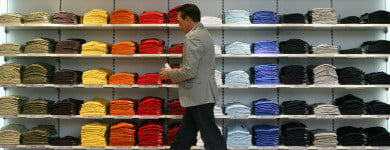Retail sales in March fell a real or inflation-adjusted 0.1 percent from February and slumped 6.3 percent compared with a year earlier, the statistics office said on Friday.
Economists were caught on the hop. They had expected a 0.5 percent rise in sales from February and a 1.3 percent increase over March last year.
A statement warned against excessive pessimism, saying the fall was due to a number of special factors including an early Easter holiday period meaning less shopping days, and a record performance in the year-earlier period.
Statistics agency Destatis also cautioned the March figures were provisional and could be adjusted as was the case for February, with the original gain of 1.6 percent being revised down to show a fall of 0.7 percent on Friday.
The drop was sharpest in sales of food, drinks and tobacco, which in March plunged a real 9.2 percent year-on-year. The amount spent at supermarkets and hypermarkets was also 9.2 percent less than in March 2007.
For everything that was not food, the picture was a little less gloomy, with sales falling 4.3 percent.
With a strong euro hitting German exporters, Chancellor Angela Merkel’s government had been counting on consumer spending to keep the economy ticking over.
But price increases may be putting paid to such hopes.
Preliminary data on Monday showed that consumer prices fell 0.2 percent in April from March but were up 2.4 percent from April last year due to higher food and energy costs.
Although more moderate than the 3.1 percent recorded for March, inflation is still above the European Central Bank’s preferred rate of just under 2.0 percent in annual terms.
Analysts also noted the outcome was also due in part to a shift in Easter holiday travel plans that would likely result in a correction next month.
“It is … becoming clear that at present the best economic policy is to fight inflation. It is a long time since it was so important,” Dekabank economist Andreas Scheuerle said on Friday.
The German economy had long seemed surprisingly resilient despite the slowdown in the United States, the international credit squeeze, a strong euro and rising prices.
But recent data and sentiment indicators have set alarm bells ringing, with the Ifo index of business giving clear evidence last week that German industry could be entering a period of weaker activity.
A better-than-expected reading in the GfK consumer confidence index on Monday gave grounds for optimism, however, with all three sub-categories in the index registering increases.



 Please whitelist us to continue reading.
Please whitelist us to continue reading.